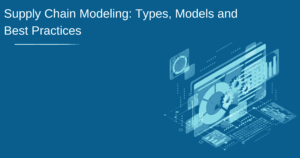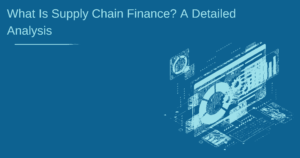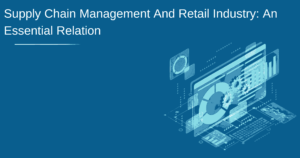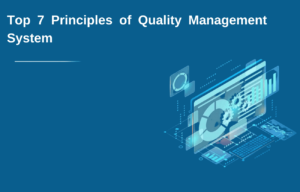There’s no doubt that blockchain is one of the hottest topics in supply chain management today. But what is it? And what implications does it have for supply chain management? This blog post will explore the concept of blockchain and how it can be used in supply chain management. We will also discuss the potential benefits and challenges associated with implementing such a system. So if you’ve been wondering what all the fuss is about, read on to find out more.
How Is Blockchain Used in Supply Chain
Blockchain in the supply chain is becoming more prevalent as the benefits of the technology are realized by more and more businesses. Blockchain offers a better, more secure and transparent approach to tracking and managing the movement of goods throughout the supply chain, from manufacturing to the point of sale. It allows businesses to optimize their operations and improve efficiencies.
In addition, blockchain can verify the authenticity of products and ensure they are not counterfeit. It is essential in the food and pharmaceutical industries, where safety is paramount.
Finally, blockchain can be used to create a digital ledger of all transactions throughout the supply chain. This could be used to help identify issues and areas for improvement. It could also be used to create a record of provenance, which would help trace back problems with contaminated products.
Explain 5 Benefits of Blockchain in Supply Chain
Streamlining Of The Process
The blockchain is a distributed database maintaining a growing list of records called blocks. Each block contains a timestamp and link to the previous block. Cryptography is used to secure the data in each block.
Blockchain streamlines the supply chain by providing a shared, immutable ledger for all supply chain members to view. This allows for more transparency and efficient collaboration among supply chain partners. The result is a leaner, more efficient supply chain that can save time and money.
Also Read: Major Decision Areas In Supply Chain Management
Tracks The Movement
In the supply chain, blockchain is best for tracking the movement of goods as they change from supplier to manufacturer to retailer and finally to consumer. By providing an immutable record of each transaction along the supply chain, blockchain can help ensure that goods are not counterfeit or otherwise tampered with. In addition, by giving all parties in the supply chain visibility into the status of goods in transit, blockchain can help optimize inventory management and reduce costs associated with excess inventory.
Improves Communication
Communication is key in the supply chain that ensures everyone is working to achieve the same goal and is updated about the latest happenings. Blockchain improves communication by providing a decentralized platform for all parties to view data and interact. This transparency and accessibility of information help to streamline the supply chain and avoid any delays or disruptions.
Reduces Costs
The cost of goods and services is always a top concern for businesses. The traditional supply chain is often fragmented, with many different suppliers and middlemen involved. This can result in inefficiencies and added costs. Blockchain technology has the potential to streamline the supply chain and reduce costs.
Blockchain can increase transparency and visibility throughout the supply chain by creating a decentralized, shared ledger of all transactions. It would allow businesses to track their products from start to finish, reducing the need for third-party intermediaries. With blockchain, companies could also make real-time tracking and payments, further reducing costs.
Conventional Vs Blockchain Supply Chain
There are many different supply chains, each with its strengths and weaknesses. In this blog post, we’ll compare two of the most popular types of supply chains: conventional vs blockchain.
Conventional supply chains are the more traditional type of supply chain. They typically rely on centralized systems and intermediaries to manage data and transactions. It can make them more efficient and easier to control but also make them more vulnerable to security threats.
On the other hand, blockchain supply chains use decentralized systems to manage data and transactions. This makes them more secure, but it also makes them less efficient and harder to control.
So, which type of supply chain is right for you? It depends on your specific needs and requirements. If security is your top priority, then a blockchain supply chain might be the better option. However, if efficiency is more important to you, then a conventional supply chain might be the way to go.
Applications of Blockchain in Supply Chain

Enhance Transparency
Blockchain technology in supply chains can help to improve transparency and traceability throughout the process. By providing a secure and decentralized platform for data sharing, blockchain can help to streamline supply chain management and reduce the chances of errors or fraud.
In particular, blockchain can track the transportation of goods through the supply chain from manufacturers to retailers. It would allow all stakeholders to have visibility into the status of shipments at any given time and could help to improve coordination and efficiency. Additionally, blockchain could verify the authenticity of products, which would help reduce counterfeiting and ensure that consumers receive what they expect.
Overall, the use of blockchain in supply chains can improve transparency and traceability while reducing costs and increasing efficiency. As such, it is an innovative solution that is worth considering for businesses operating in this space.
Improve Efficiency
Blockchain is known as the distributed ledger technology that can be used to track and manage the flow of goods and information throughout the supply chain. By creating a shared, immutable record of all transactions, blockchain can help streamline supply chain management and improve efficiencies.
Some potential applications of blockchain in the supply chain include:
- Tracking the movement of goods throughout the supply chain
- Validating product authenticity
- Managing supplier information and contracts
- Improving visibility into inventory levels
By leveraging blockchain, businesses can improve the efficiency of their supply chains and create a more transparent and efficient system for tracking goods and information.
Reduce Errors
The accuracy of information is crucial in the supply chain industry as it ensures that the right goods are delivered to the right place within the stipulated timeline. Inaccurate information can lead to delays, errors, and even financial losses.
The blockchain is a distributed database allowing secure, transparent, and tamper-proof record-keeping. This makes it an ideal solution for supply chain management as it can help reduce errors and improve transparency.
For example, blockchain can track products from manufacturing to retail. This would allow all stakeholders to have visibility into the supply chain and ensure that products are delivered as expected. Blockchain can also be used to track provenance, ensuring that products are genuine and have not been tampered with.
Overall, blockchain has the potential to greatly reduce errors in the supply chain industry by providing a secure and transparent platform for information management.
Improve Finance
The distributed ledger technology of blockchain has the potential to streamline supply chains and improve finance. Blockchain can reduce errors, increase efficiency, and lower costs by automating routine tasks and increasing transparency.
Applications of blockchain in supply chain management include:
- Automating the tracking of goods and inventory
- Improving visibility into the supply chain
- Reducing the time it takes to settle transactions
- Enabling new financing models such as factoring and dynamic discounting
In particular, blockchain can improve finance in the supply chain by reducing the time it takes to settle transactions. By automating the tracking of invoices and payments, blockchain can help reduce accounting errors and speed up payment processing.
In addition, blockchain-based financing models such as factoring and dynamic discounting can provide early payment to suppliers, improving cash flow and working capital management.
Step By Step Approach For Blockchain in Supply Chain
If you’re looking to implement a blockchain in your supply chain, there are a few things you need to keep in mind. Here is a step-by-step approach to doing so:
- Define the problem you’re trying to solve.
This is the most important step. You need to clearly understand what problem you’re trying to solve with blockchain. Once you know that, you can determine if blockchain is the right solution for you.
- Do your research and develop a proof of concept.
After you’ve defined the problem, it’s time to do your research. This includes looking into different blockchain platforms and determining which one would be the best fit for your needs. Once you’ve settled on a platform, it’s time to develop a proof of concept. This will help you test out the feasibility of your solution and fine-tune it before moving on to implementation.
- Create a roadmap and secure funding.
Once you have a proof of concept, it’s time to create a roadmap for implementation. This roadmap should include timelines, milestones, and budgeting considerations. Once having that in place, it’s time to start securing funding for your project. Without adequate funding, your project will likely stall before it gets off the ground.
Also Read: Know Essential Components Of Supply Chain Management
What Are The Loopholes Involved in Blockchain For Supply Chain?
The first thing to know about blockchain is that there is no “master” copy of the data. Rather, each participant in the network has a copy of the data. This decentralized approach has several advantages, chief among them being increased security. When there is no central point of control, it becomes challenging for hackers to corrupt the system.
Another advantage of blockchain is that it allows for near-instantaneous transactions. Because there is no need to wait for a central authority to approve each transaction, they can be processed much faster. This is particularly beneficial in supply chain management, where time is often of the essence.
Finally, blockchain provides a high degree of transparency. Because every transaction is recorded and visible to all participants, it becomes tough to hide or tamper with information. This could help increase accountability and trustworthiness throughout the supply chain process.
However, there are some possible drawbacks to using blockchain in supply chain management. One issue is that the system can only work if there is widespread adoption by all involved parties. Without buy-in from everyone in the supply chain, the system will not be able to function properly. Another potential issue is scalability. As more and more data is added to the blockchain, it could become increasingly difficult for individual users to process and manage all of the information.
Future Advancement Of Blockchain in Supply Chain
The advancement of blockchain in the supply chain is inevitable. With the increasing adoption of blockchain technology, there is a growing need for efficient and secure supply chain management. Blockchain provides a distributed ledger system that can be used to track and manage the flow of goods and information throughout the supply chain. This allows for greater transparency and traceability, which can help improve supply chain operations’ efficiency. Additionally, blockchain can help reduce the risk of fraud and counterfeiting and provide a platform for smart contracts.
As blockchain technology continues to evolve, we can expect some futuristic and more innovative applications for the supply chain management. For instance, blockchain-based solutions are already being developed that can track the origin of food products, ensuring their safety and being sourced from reputable suppliers. Blockchain could also manage other aspects of the supply chain, such as transportation and logistics. Ultimately, blockchain has the potential to transform how businesses operate and manage their supply chains – making them more efficient, transparent, and secure.
Conclusion
Blockchain in the SCM is a relatively new concept with much potential. By using blockchain technology, businesses can create a transparent and secure system for tracking the transportation and management of goods through the supply chain. This can help improve efficiency, reduce costs, and provide greater visibility into the supply chain for all parties involved. If you are considering implementing blockchain in your own business, it is essential to research and work with a reputable company with experience in this area.
If you want to widen your perspective regarding the supply chain, take a quick look at our Advanced Certificate in Operations, Supply Chain and Project Management. It is an ideal course plan that will take you through all the nooks and crannies of the supply chain.
More Information:
Objectives Of Supply Chain Management Explained
Green Supply Chain Management: What It Is and Why It Matters?




























